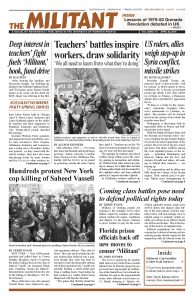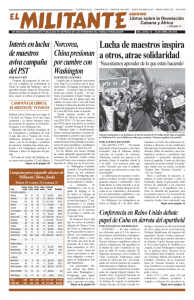Under the U.S. capitalist “justice” system, hundreds of thousands of working people are incarcerated without having been convicted of any crime, the vast majority stuck behind bars for days, months or years because they can’t afford bail.
The United States has the world’s highest incarceration rate. Some 1.5 million people are in federal or state prisons, 615,000 in local jails and 4.8 million on parole or probation. Over 70 percent of those in jails have not been convicted of anything, according to the Prison Policy Initiative.
Seeking to make big profits off this situation, bail bondsmen, backed by large corporations, offer to fund prisoners’ release pending trial, but at a very steep price.
If you have access to ample cash — sometimes tens of thousands of dollars or more — to meet bail requirements, you’re immediately released and get your money back after showing up in court for subsequent hearings.
But many workers facing charges have to turn to bail bondsmen. They charge a nonrefundable 10 percent fee. Those who can’t cover this are saddled with loan payments and high interest rates, as well as other arbitrary fees and intrusions into one’s personal life. Given this harassment, some people decide to plead guilty to crimes they did not commit to escape from the financial demands of a bondsman. This is just one of many ways the presumption of innocence is undermined.
“Bondsmen have extraordinary powers that most lenders do not,” described an April 1 New York Times article titled, “When Bail Feels Less Like Freedom, More Like Extortion.”
“Some states give them broad latitude to arrest their clients for any reason — or none at all. A credit card company cannot jail someone for missing a payment. A bondsman, in many instances can,” the article said.
Bond agents have also imposed curfews on their clients, searches of their cars or homes at any time, and access to medical and other records.
“When a home health care aide wanted to bail her son out of Rikers Island in New York City,” reported the Times, “she was charged $1,000 to have a courier walk her money a few blocks to the courthouse.” Some have been forced to wear ankle monitors at a cost of $300 a month.
In Santa Clara County, California, Gregory Chiotti received a bill from Jake’s Bail Bonds for $39,755 and a notice of foreclosure on his house he had put up as collateral for the bonds taken out on his daughter. At the time she already had been convicted and was in jail, the Times reported. After paying these extortion funds, Chiotti got a second notice of foreclosure six years later, saying he now owed the bondsman $117,500.
Up until the end of the 19th century, those accused of a crime were released without having to make upfront cash payments as long as a person or entity took responsibility for their return for trial. Payment was only required if a defendant didn’t appear.
With a 60 percent increase of the U.S. prison population under the Clinton administration in the 1990s, use of bail became more extensive. According to the Pretrial Justice Institute, both dollar amounts of bonds and the number of crimes for which bail is set increased by 50 percent during this time.
The for-profit bail bonding industry rakes in $2 billion in annual revenue, according to the Justice Policy Institute. Its operations are only legal in the U.S. and the Philippines.
In New Orleans, for example, 63 percent of individuals accused of misdemeanors and 87 percent accused of felonies had to pay a bondsman as a condition of release before trial, according to the Vera Institute of Justice.

